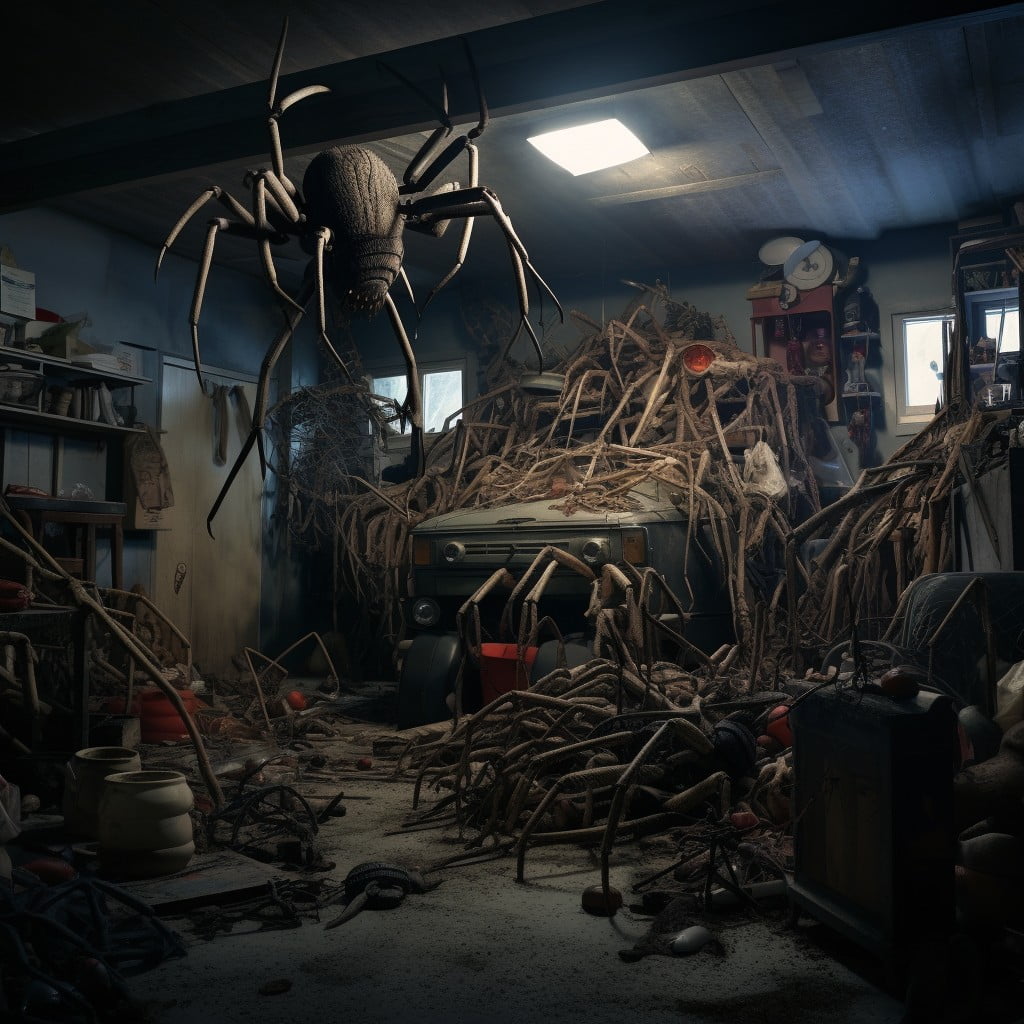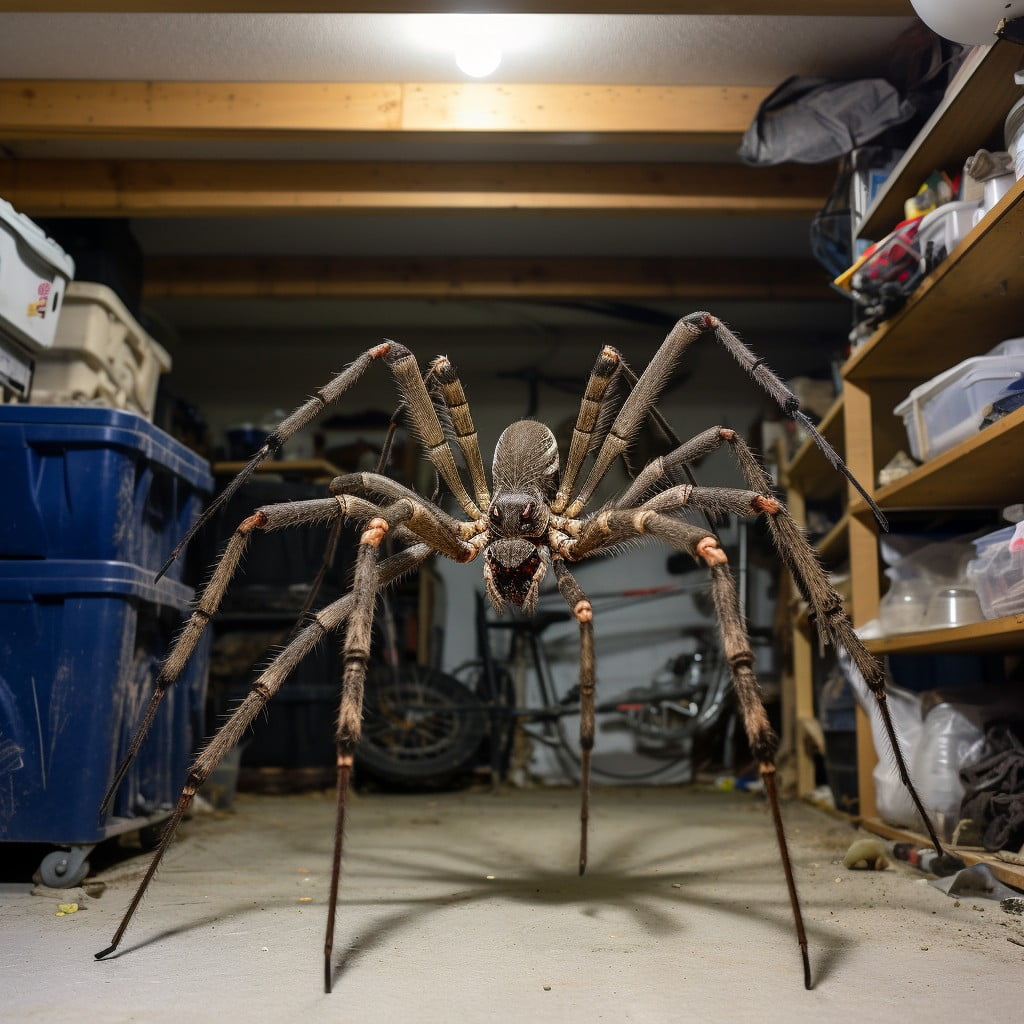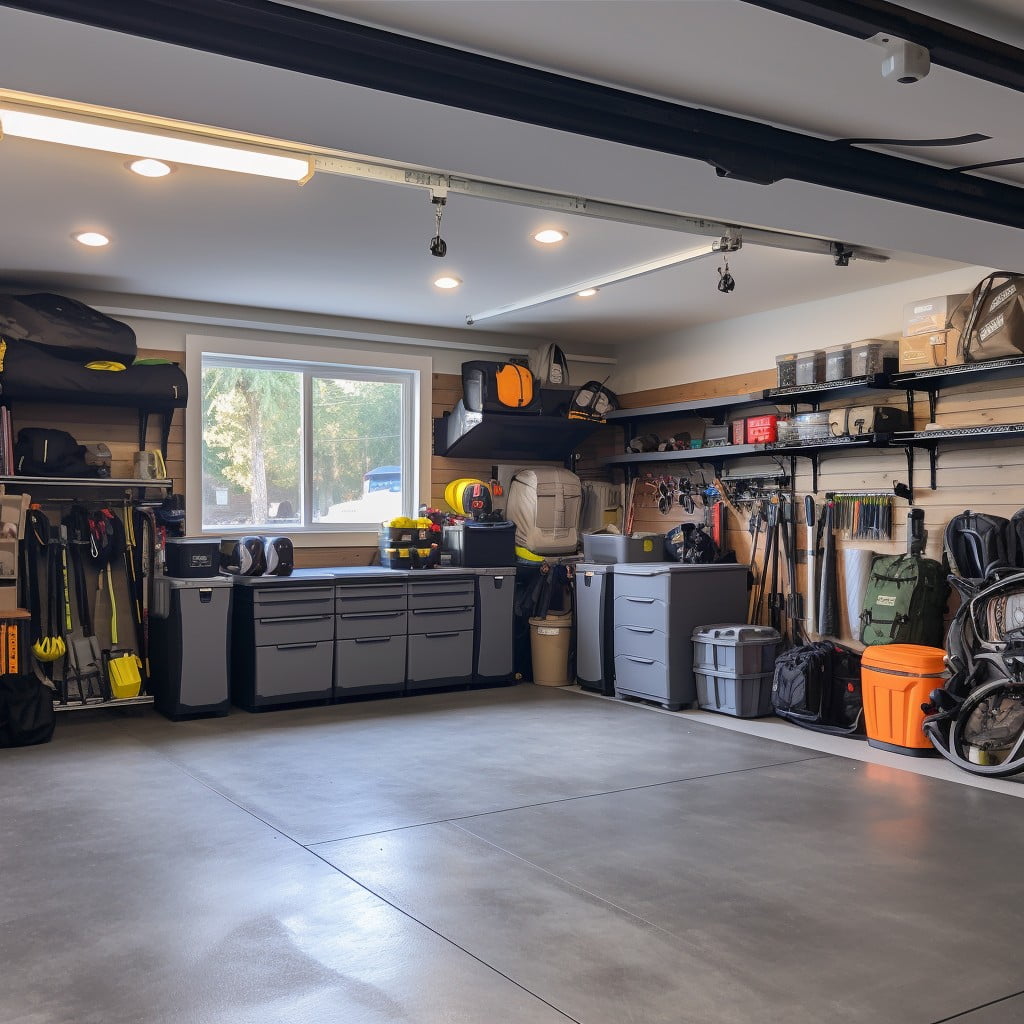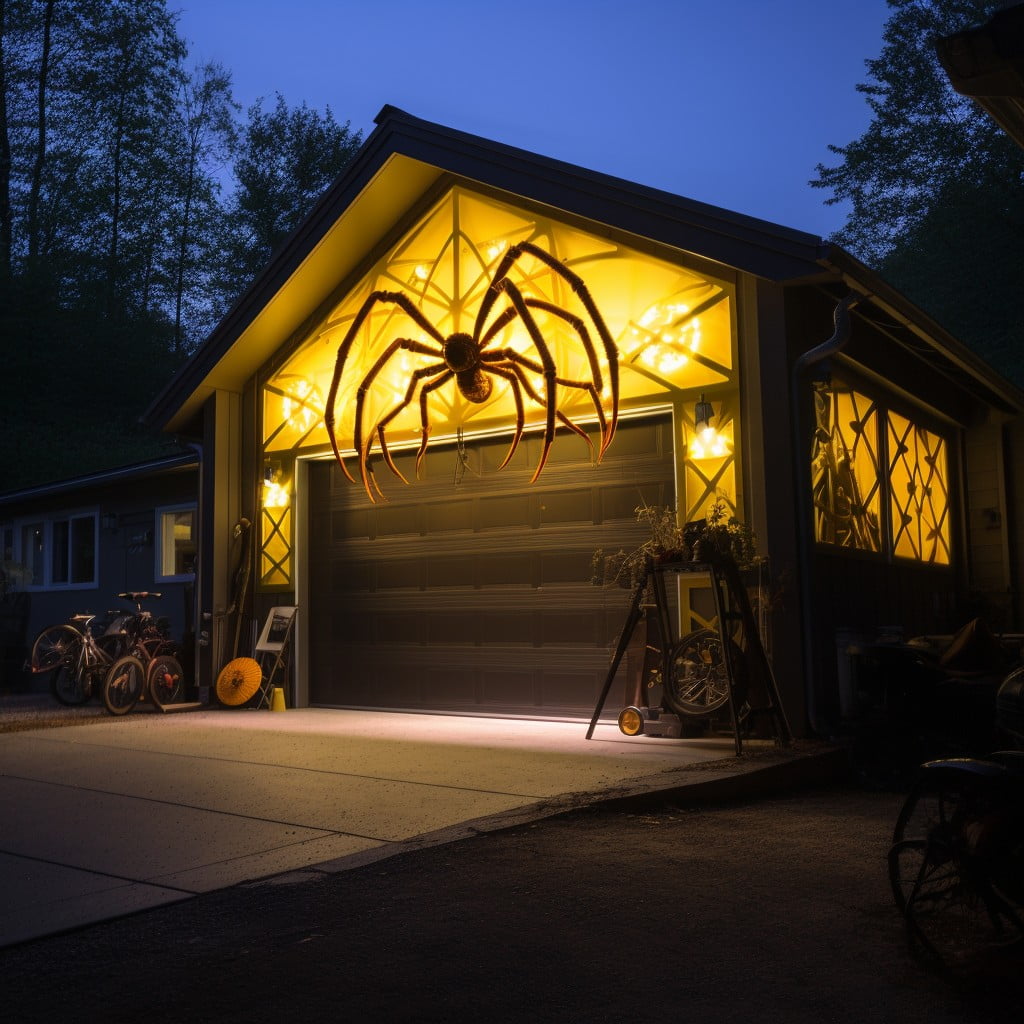Explore practical and effective methods for keeping spiders out of your garage, ensuring a cleaner and safer environment.
Keeping spiders out of your garage can be a daunting task, but with the right strategies, it’s absolutely achievable. This article offers practical and effective methods to discourage these eight-legged creatures from making your garage their home.
From simple cleaning tips, strategic placement of deterrents, to using natural and chemical spider repellents, you’ll find all the necessary details here. Read on to discover how to maintain a spider-free garage and prevent future infestations.
Key takeaways:
- Spiders are attracted to the dark, quiet environment of garages.
- Different spider species may inhabit your garage, including the Brown Recluse and Black Widow.
- Decluttering and organizing your garage is an effective way to keep spiders out.
- Switching to warm yellow lights can deter spiders from your garage.
- Sealing cracks, gaps, and openings in your garage prevents spiders from entering.
Why Are Spiders In Your Garage?

Spiders seek cozy, safe environments to spin their webs and catch prey. Your garage offers them just that. It’s dark, quiet, and provides numerous hiding spots behind boxes, under shelves, or in corners.
Additionally, garages can often become home to many small insects, which make a perfect meal for spiders. Thus, making your garage an attractive habitat. The combination of shelter and abundant food source explains their frequent presence, despite your dismay.
Moreover, some spiders are attracted to dampness which garages, with their typically cool concrete floors, tend to provide. Also, the multitude of nooks and crannies around a garage door, as well as in the walls and roof, serve as convenient access points for these eight-legged visitors.
What Kind of Spiders Should You Expect in Your Garage?

Garages can become home to a variety of spiders, which differ based on geographic location, local vegetation, and the spider species’ preferred environment. Some of the more common varieties might include the Brown Recluse, known for its venomous bite, or the American House Spider which, despite its name, frequently takes up residence in garages.
Other potential invaders might consist of the Wolf Spider, a strong hunter often mistaken for tarantulas due to their size and hairy body, or the Cellar Spider which thrives in damp locations.
It’s also common to encounter a Black Widow in the corners of garage spaces, identifiable by its shiny black body and the famous red hourglass shape on its abdomen.
Understanding which spiders you’re likely to encounter is a significant first step in formulating an effective deterrent strategy. Remember, spiders serve an essential role in the ecosystem by controlling populations of other pests, and not all spiders are harmful to humans. Gain knowledge about local species and approach your garage’s spider situation accordingly.
Maintain a Clutter-Free Garage

Depriving spiders of their ideal living conditions is a great measure to prevent their invasion. Here’s why cluttered garages are a magnet for eight-legged invaders:
1. Concealment: Clutter gives spiders a place to hide, and that’s exactly what they are looking for. The less clutter you have, the fewer places spiders will find to hide, thus reducing their presence.
2. Food Supply: Clutter often leads to an accumulation of other insects, providing a food source for spiders. Reducing this means you’re indirectly taking away their source of food, making the environment less appealing.
3. Breeding: Messy garages are optimal for spiders to breed. The more things you have piled up, the more homes you provide for their young.
Hence, regularly decluttering and organizing your garage can be a simple, yet effective method to keep it spider-free. Remember, a neat, well-lit, minimalistic garage is your first line of defense against these creatures.
Use Warm Yellow Light to Keep Spiders Away

Contrary to popular belief, not all types of light attract insects. The blue light spectrum, typically produced by LED and fluorescent lights, actually attracts more insects. This is due to their phototactic attributes. On the contrary, spiders and many flying insects find the warm, yellow spectrum of light less appealing. So, switching your garage lights to yellow can significantly reduce the presence of these pests.
For the most effective results, opt for sodium vapor lights. They emit a deep yellow, almost amber light, which is proven to be least attractive to spiders. Not only will these help repel spiders, but they are also a more energy-efficient option. Additionally, if it’s possible and safe, try installing the lights away from the garage to draw spiders and insects away from the area.
Remember, always handle your electrical installation and replacements safely, or hire a professional to ensure a risk-free installation. Be mindful that while lighting can be a strategic deterrent, it should be used alongside other preventive measures for comprehensive spider control.
Seal All Cracks and Openings in Your Garage
Gaps, nooks, and cracks, however smaller they might seem, are potential entry points for spiders. It’s crucial to carry out regular checks for these irregularities and promptly seal them. The garage door is the most obvious place to start. Ensure that the seal at the bottom of your garage door is intact and blocks any possible entries. Consider getting a door sweep, if it is not already in place.
Additionally, examine the windows and walls for cracks that may have developed over time due to temperature changes or structural shifting. While small cracks may seem insignificant, they can be a spider freeway into your garage.
Weather stripping is an inexpensive and effective solution for sealing cracks around windows and doors. Silicone sealant can be used for larger cracks in walls and flooring, while insulating foam sealers are suitable for bigger gaps around pipes and vents. Always remember to put on appropriate protective gear, such as gloves and goggles, to safeguard yourself while handling these materials.
For an extra layer of defense, consider installing screens over vents and windows. Not only will they block spiders but also other insects.
Regular maintenance checks for seal degradation can go a long way in ensuring that your garage stays spider-free.
Appropriate Use of Commercial Insecticides
When using commercial insecticides, precision and caution are crucial. These potent products should be applied primarily to known spider hotspots, including corners, cracks, and crevices. Don’t forget to treat the areas around windows and doors as well – they often serve as entry points for these eight-legged tenants.
Always read and follow the manufacturer’s instructions for safe and effective use. Remember, overuse of insecticides may not necessarily result in a higher kill-rate but could potentially lead to chemical resistance among spiders, besides posing health risks for humans and pets.
Furthermore, opt for insecticides with a residual effect – these continue to deter spiders long after the initial application, usually for several weeks or even months.
And one more thing. Consider products labelled as “natural” or “non-toxic.” While most might not be as potent as their chemical counterparts, they typically pose less risk to people, pets, and the environment.
How Essential Oils Help in Keeping Spiders Out
Certain essential oils, with their intense aromatic properties, act as a natural deterrent against spiders. Peppermint oil, which has a strong scent that spiders find repulsive, can be utilized. Mix this oil in a spray bottle with water and spray it around your garage.
Lemon, lavender, and eucalyptus oils are also effective spider repellents. Like peppermint oil, these can be combined with water and sprayed in the areas of your garage where you often see spiders.
Cinnamon oil, a potent insect repellent, can discourage spiders from making their homes in your garage. However, it should not come into direct contact with plastic or painted surfaces, as it can cause discoloration.
Remember, it’s important to reapply your chosen essential oil spray on a weekly basis, or after heavy rain, to maintain its efficacy. Do not overuse the oils as they are potent; a few drops would suffice for each application. Also, do ensure the health and safety of any household pets when using essential oils, as some can adversely affect animals.
Natural Spider Deterrents for Garages
Among the various tools in your arachnid-ousting arsenal, mother nature provides some of the most effective. There are countless herbs and plants that spiders detest and won’t go near – deploying these at strategic points can turn your garage into a no-go zone for these many-legged invaders.
First up is the vinegary aroma of eucalyptus. Spread its leaves around, or use eucalyptus oil to keep spiders at bay. Next, consider peppermint, a natural spider deterrent due to its intense smell. Simply mix peppermint essential oil with water and spray it around your garage.
Citrus serves as another excellent repellent; scattering peels of lemons or oranges can work wonders. Similarly, tea tree oil delivers a one-two punch with its strong scent.
Looking for a DIY repellent? Mix equal parts white vinegar and water in a spray bottle, and voila! You have an inexpensive, homemade spider deterrent.
However, remember to handle with care if you have pets, as some of these substances could be harmful to them. Always prioritize safety while working towards a spider-free garage.
Effective Electronic Spider Deterrents for Your Garage
Ultrasonic pest repellers are an effective electronic solution. These devices emit high-frequency sound waves that spiders dislike, thus discouraging their presence. They offer the advantage of being non-invasive and safe for pets and humans, while causing discomfort to eight-legged invaders.
Placement is essential when using ultrasonic repellers. Install them near garage entrances, windows, and moist, dark corners where spiders often reside. Each device typically covers a certain area, so you may need multiple units for larger garages.
Another option is electromagnetic pest repellers that can alter the electromagnetic fields within your garage’s wiring. This change disrupts spiders’ natural navigation and makes the environment uncomfortable for them.
Electronic spider vacuums can also be considered. These devices suck the spiders in without causing harm, helping to maintain a spider-free zone. A spider vacuum works best when you already have a limited number of spiders and want an immediate solution.
It’s important to note electronic deterrents work best as part of an integrated pest control strategy. Combining these solutions with other preventative measures ensures a thorough and sustainable approach to keeping spiders out of your garage.
FAQ
What can you put in garage to keep spiders away?
To keep spiders away from your garage, spray it regularly with essential oils, as the scent is believed to be intolerable to them.
What causes spiders in garage?
Spiders in the garage are typically attracted by clutter, junk, and open storage boxes, which can be mitigated by using sealed storage containers for organization and tidiness.
How do I keep spiders away permanently?
Regular vacuuming and thorough cleaning of corners, crevices, windows, and basements, coupled with diligent inspection of storage areas such as recycling stashes of cardboard boxes, can effectively deter spiders from nesting and permanently keep them away.
What are the most common types of spiders found in garages?
The most common types of spiders found in garages include the Brown Recluse, Black Widow, and the House Spider.
Are there specific garage designs that deter spiders?
Yes, garage designs that incorporate sufficient lighting, minimal clutter, and sealed entrances can help deter spiders.
Can certain lighting options in a garage help reduce spider infestations?
Yes, certain lighting options in a garage, such as using yellow or sodium vapor lights, can help reduce spider infestations by attracting fewer insects that spiders prey on.